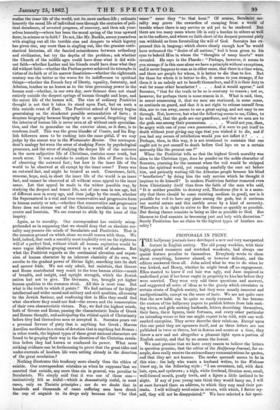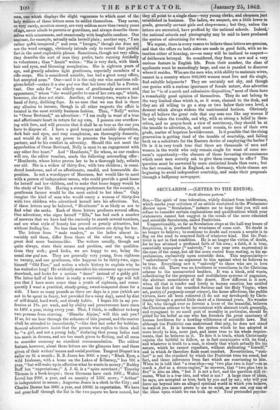PROPOSALS IN PRINT.
THE halfpenny journals have developed a new and very unexpected. feature in English society. The old penny weeklies, with their highly-spiced romances and wretched woodcuts, had always one quaint feature peculiar to themselves. Everybody wrote to them about everything, however absurd, or however delicate, and the editors answered them all. John asked what he was to do when he was kicked, and Henry, whether he might break off an engagement. Ellen wanted to know if red hair was ugly, and Jane inquired in underlined print if her lover ought in propriety to kiss her before they were married. They were very odd these questions and answers, and suggested all sorts of ideas as to the gossip which circulates in certain strata of English society, but they were usually innocent and unobjectionable, except on the score of taste. We are not quite sure that the new habit can be quite so easily excused. It has become the custom of the halfpenny papers to publish letters from lads seek- ing wives, and girls seeking husbands, letters describing themselves, their faces, their figures, their fortunes, and every other particular an intending wooer or fair one might expect to he told, with one well- marked exception. They never describe their relations. Except upon this one point they are openness itself, and as these letters are not published in twos or threes, but in dozens and scores at. a time, they throw a new and not altogether a pleasant light upon a portion of English society, and that by no means the lowest.
We must premise that we have every reason to believe the letters in question genuine, that the editor of the Rol/penny Journal, for ex- ample, does really receive the extraordinary communications he quotes, and that they are not hoaxes. The modus operandi seems to be in this wise : the lady who wants a husband writes, to the Welcome Guest say, in the following style : "I am seventeen, tall, with dark hair, eyes, and eyebrows ; a high, white forehead, Grecian nose, small, well-formed mouth, pearly teeth, and a figure a little inclined to be slight. If any of your young men think they would fancy me, I will at once forward them an address, to which they may send their por- traits. I will willingly send mine in return, with which, I flatter my- self, they will not be disappointed." We have selected a fair sped. men, one which displays the slight vagueness to which most of the lady writers of these letters seem to addict themselves. They never, or very rarely, mention money, are very seldom more than twenty years of age, never allude to parents or guardians, and always describe them- selves with minuteness, and occasionally with laughable candour. One aspirant, for example, actually calls herself plain; another says, "I am rather qukk-tempered ;" and even ." Imogen," though she does net use the word scraggy, obviously intends only to record that painfig fact in the most euphuistic phrase. Sometimes, though not very erten, they describe the sort of man they prefer, taste running decidedly to volunteers ; thus "Annie" writes: "She is very dark, with black hair and eyes, and blooming complexion. She is eighteen years of age, and greatly admires light gentlemen, especially members of a rifle corps. She is considered amiable, has had a great many offers, but accepted none." One—and it is the only one who mentions reli- gious belief—makes it a sine qua' non that her lover shall be a Protes- tant. One asks for "an elderly man of gentlemanly manners and appearance," whom "she would prefer to one of her own age," which, however, she does not state. Another, of twenty-two, wants a hus- band of forty, disliking fops. In no case that we can find is there any allusion to income, though in all other respects the affair is treated in the most strictly business fashion. Thus, "Nelly" writes to "Oscar Bertrand," an advertiser: "I am really in want of a true and affectionate heart in return for my own. I possess one overflow- ing with love, and will promise that it shall be as true as the one you have to dispose of. I have a good temper and amiable disposition, dark hair and eyes, and rosy complexion, am thoroughly domestic, and would do all in my power to promote the happiness of my partner, and be his conNfort in adversity. Should this not meet the approbation of Oscar Bertrand, Nelly is open to an engagement with any other free heart." And " Heathcote," or whom, as our readers will see, the editor vouches, sends the follovking astounding offer; " Heatheote, whose letter proves her to be a thorough lady, solicits our aid. She is a widow of thirty-five, with two children; is consi- dered handsome, and of an affectionate, candid, and honourable dis- position. Is not a worshipper of Mammon, but would like to meet with a person of independent means, who could provide a good home for herself and her children, and to make that home happy would be the study of her life. Having a strong preference for the country, a gentleman farmer would be the most suited to her ideas." Only imagine the kind of man who would marry a woman of thirty-five with two children who advertised herself into his affections. Yet, if these letters may be believed, " Heathcote" is as likely as not to find what she seeks. Each of these letters produces several offers. One advertiser, who signs herself "Ella," has had such a number of answers that we have had the curiosity to search several numbers, and see what style of beauty has proved so greatly attractive, but without finding her. No less than ten advertisers are dying for her.
The letters from "male readers," as the ladies almost in- variably call them, differ from those of the other sex, being a great deal more business-like. The writers usually, though not quite always, state their means and position, and the qualifica- tions they seek; good looks, we are happy to see, being the usual sine qua' non. They are generally very young, from eighteen to twenty, and one gentleman, who happens to be thirty-two, signs himself "Old Parr," and writes a whole history to explain why he has waited so long! He evidently considers his enormous age a serious drawback, and looks for a serious "dame" instead of a giddy girl. The latter half of his letter is really a curiosity: "My age will tell you that I have more sense than a youth of eighteen, and conse- quently I want a practical, steady-going, sweet-tempered dame for a wife. I have as many pounds as there are days in a year (which are not to be spent in finery, but provided for a rainy day), saved by dint of self-denial, hard work, and steady habits. I began life in my pro- fession at 18s. per week, and by ability and perseverance have risen to 1401. a year, rising every year. That, I think, is sufficient to keep two persons from starving. 'Blanche Alpine,' will this suit you P If so, let me hear through the columns of this journal, and the matter shall be attended to immediately,"—like that last order for bobbins. Several advertisers insist that the person who replies to them shall be "a girl, and not a young lady," declaring that young ladies cost too much in dresses, and are too much given to flirting, and all seem to consider economy an excellent recommendation. The oddest feature, however, about these letters are the glimpses here and there given of their writers' means and social position. Tangent Dispart is a sailor on 6/. a month ; R. B. tones has 300/. a year; "Black Eyes, a wild Irishman, with a home on the Lakes of Killarney," has 80/. a year, "but will make up in affection what he wants in money ;" Rubley Buff has "expectations ;" A. J. G. is a" spice merchant ;" Timothy Thomas is a book-keeper; three Germans have each 1001.; Walter Lovel has 2001. a year, and an annuity of 1501. more ; "Arthur" is independent in means ; Augustus Jones is a clerk in the City; and Charles Downs has 300/. a year, and 50001. in expectation. We have not gone half through the list in the two papers we have named, but they all point to a single class—very young clerks, and shopmen just established in business. The ladies, we suspect, are a little lower in grade, generally servant girls and shopwomen ; but they, unless the letters are corrected, have profited by the national schools. Indeed,' the national schools and photography may be said to have produced the system of advertising for wives.
• We repeat, there is every reason to believe these letters are genuine, had that the offers on both sides are made in good faith, with no in- tention either of hoaxing, or—as many will be inclined to suspect— of deliberate betrayal. So considered, they form a new and a very curious feature in English life. From their number, the class of applicants must be exceedingly large, and one is puzzled to discover where it resides. Who are the men who, with ability to maintain wives, cannot in a country where 800,000 women must live and die single, find suitable helpmeets? They are certainly not shy, and though one genius with a curious ignorance of female nature, does advertise that he "is of a meek and submissive disposition," most of them have a remarkably good opinion of themselves. They do not belong to the very limited class which is, as it were, chained to the desk, and they are all willing to go a step or two below their own level, a descent which always widens the matrimonial horizon. Obviously they all believe the great rule that any man can like any woman if he only takes the trouble, and why, with so strong a belief in them- selves, and so prayer-book a view of matrimony, they should be at the trouble to advertise, is, and must remain, to men of their own grade, matter of hopeless bewilderment. Is it possible that the rising generation is getting tired of the trouble of courtship, and falling back on a substitute for the Eastern device of employing the barber ? Or is it in very truth true that there are thousands of men and women in the world who only remain single for want of some mo- ment's opportunity—the absence of those favouring circumstances which most men secretly ask to give them courage to offer? The question must be answered by more statistical heads than ours; but the fact remains, that in England, as in Germany, whole classes are beginning to avoid independent courtship, and make their proposals through a halfpenny newspaper.































 Previous page
Previous page